OWC Mercury Electra 3G MAX 960GB Review: 1TB of NAND in 2.5" Form Factor
by Kristian Vättö on October 18, 2012 1:00 AM ESTRandom Read/Write Speed
The four corners of SSD performance are as follows: random read, random write, sequential read and sequential write speed. Random accesses are generally small in size, while sequential accesses tend to be larger and thus we have the four Iometer tests we use in all of our reviews. Our first test writes 4KB in a completely random pattern over an 8GB space of the drive to simulate the sort of random access that you'd see on an OS drive (even this is more stressful than a normal desktop user would see).
We perform three concurrent IOs and run the test for 3 minutes. The results reported are in average MB/s over the entire time. We use both standard pseudo randomly generated data for each write as well as fully random data to show you both the maximum and minimum performance offered by SandForce based drives in these tests. The average performance of SF drives will likely be somewhere in between the two values for each drive you see in the graphs. For an understanding of why this matters, read our original SandForce article.
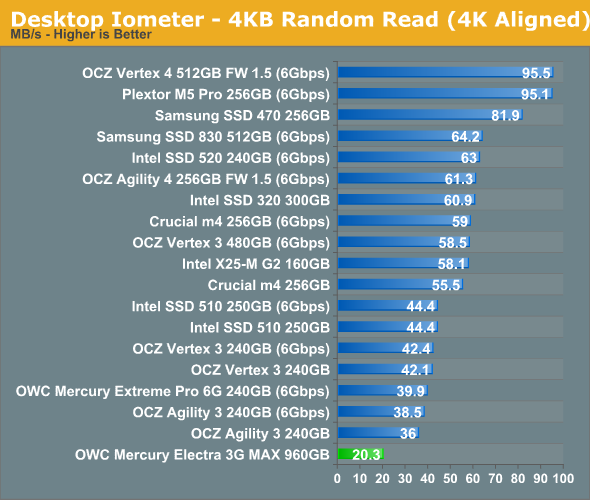
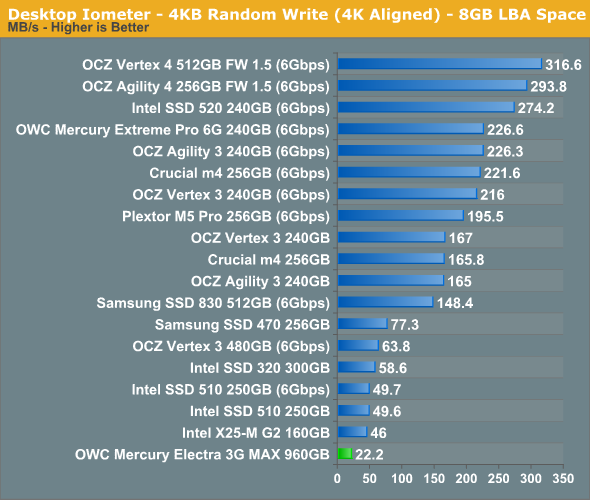
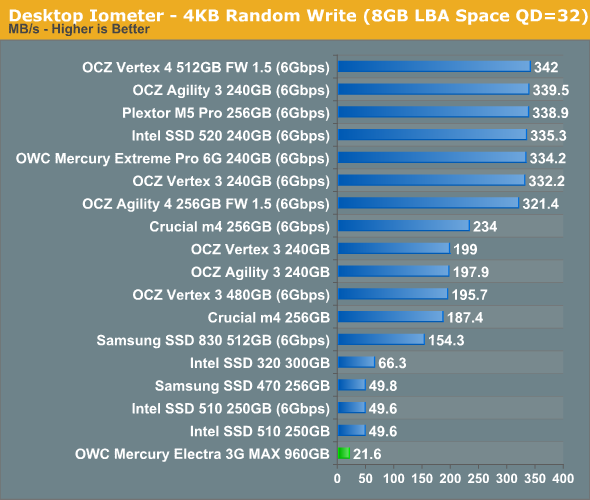
To be straight, random performance is horrible. Regardless of the queue depth and IO type (read/write), random performance tops out at around 22MB/s. I ran each test a few times to double-check but performance didn't get any better. I asked OWC if this is normal and they said it is, which also explains why OWC isn't reporting any random read/write speed figures. Ouch.
The SF-2181 controller is good for up to 60K 4KB random read/write IOPS, so that's definitely not the bottleneck. With two controllers in RAID 0, we should get random performance of over 100K IOPS at higher queue depths, although SATA 3Gbps would limit us to around 70K IOPS max. If the SSD controller is not the bottleneck, it leaves us with only one option: the RAID controller. Like I said, Siicon Image's RAID controller is not a very high-end one and the product page says it's actually a SATA to dual-eSATA controller, meaning that it's mainly aimed to be used with external hard drives, which don't offer great random IO performance to begin with. It definitely wasn't designed with SSDs in mind and I'm starting to think that OWC opted for it because there simply wasn't another viable option.
Sequential Read/Write Speed
To measure sequential performance we ran a one minute long 128KB sequential test over the entire span of the drive at a queue depth of 1. The results reported are in average MB/s over the entire test length.
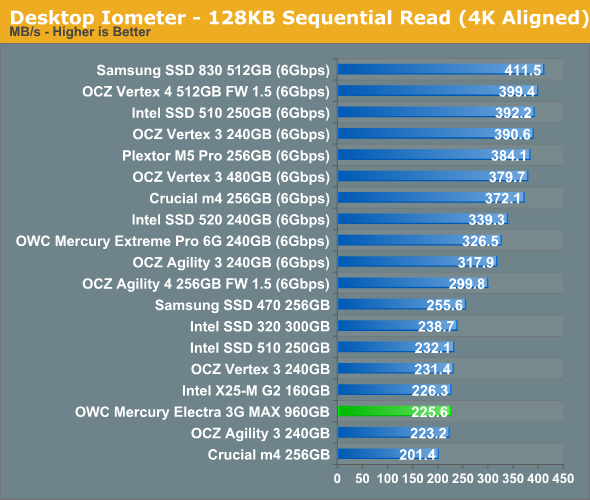
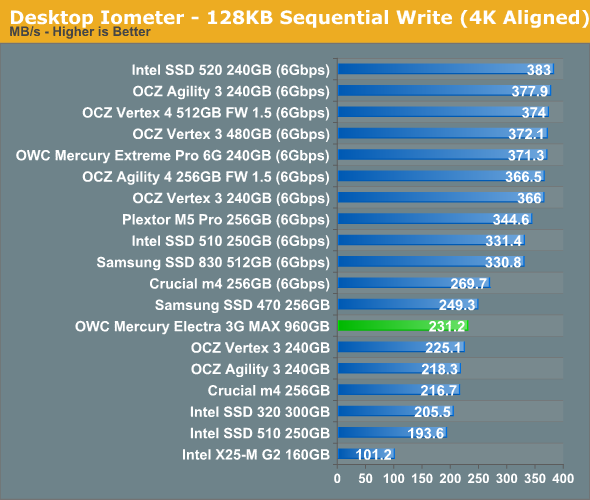
Sequential performance is much better than random speeds and now we're seeing figures typical for SATA 3Gbps SSDs. In terms of performance, there doesn't seem to be much gain from RAID 0 as for example OCZ Vertex 3 performs similarly when used in a SATA 3Gbps environment.










36 Comments
View All Comments
dishayu - Thursday, October 18, 2012 - link
I see 2x Crucial m4 in the charts? Is it the same drive running sata 2 and sata 6gbps?JarredWalton - Thursday, October 18, 2012 - link
Correct. The one line says "Crucial m4 256GB (6Gbps)" and the other is "Crucial m4 256GB"; there are a couple other drives tested on both 6Gbps and 3Gbps (Vertex 3 and Agility 3).jigglywiggly - Thursday, October 18, 2012 - link
yeah this is junk.just get a 500gb vertex 4
Argyris - Thursday, October 18, 2012 - link
I think there's one consideration that wasn't mentioned, and that's durability. I can't of course speak for this specific model (maybe the more complex internals could impact long-term durability, but most likely not), but for SSDs in general this is a major plus. I've been rather unlucky with HDDs and have lost two of them to physical impact damage. One of the main reasons I bought a SSD for my main laptop was so I don't have to worry about this happening again.If you're dependent on your laptop for your work and you need a lot of storage space (more than 512GB), the peace of mind of knowing that your whole livelihood's worth of data is safer than if it were on a spinning disc has got to be worth a few bucks.
Still, though, you have to wonder how many of these people couldn't get by for the time being with a 512GB drive (or the 768GB one offered by Apple).
Denithor - Thursday, October 18, 2012 - link
Well, first, if your data is so critical it should be backed up routinely on a very regular schedule. Offsite. Like every night, uploaded to a cloud drive somewhere.Which would effectively address the need for more than 512GB/768GB of "hands-on" high-speed storage - as everything not needed routinely could be kept on external drive and/or cloud storage.
Wolfpup - Thursday, October 18, 2012 - link
I'd generally trust a mechanical hard drive more than an SSD for reliability. The ONLY brands I'd trust for SSDs are Micron/Crucial and Intel...no way in heck I'd get a sandforce drive from someone else, and even then they haven't been 100% perfect.ArKritz - Saturday, October 20, 2012 - link
Great, more Samsung for the rest of us...yankeeDDL - Thursday, October 18, 2012 - link
I love the novelty: I think raid0 is a great solution to keep costs low, use the current hardware/NANDs.I also don't mind the performance. But the price?
There are already SSDs with costs below $1/GB. For 1TB, the cost of enclosure, assembly, boards ... should be proportionally lower. I think it would be fair in today's market to pay $750~$800 for this SSD, but no more.
I am still an SSD-skeptic at these costs: sorry but for me until I can get 1TB for less than $300, this is a no-no. Yes, I can install a mechanical HD for storing large files, but I dual-boot and ~100GB are always gone between Windows and Linux, so 256GB feel too tight and anything larger is still way too expensive.
JarredWalton - Thursday, October 18, 2012 - link
Note: editing to remove some referrals. Sorry, but if we leave those in we just encourage spammers and run the risk of more people doing this.RE: Love the novelty, not the price by amdwilliam1985 on Thursday, October 18, 2012
Check out Samsung 830 from amazon, I got the email this morning, man these are lovely prices. I got my Samsung 128GB for more than $150 a while ago.
samsung 830 128gb = $69.99
http://www.amazon.com/dp/B0077CR60Q/
samsung 830 256gb = $154.99
http://www.amazon.com/dp/B0077CR66A/
Not sure how long these prices will last.
If I don't already own an SSD in my windows 7 laptop, I'll be grabbing the 256gb for sure. Samsung and Intel has the best quality as far as I know in SSD.
DanNeely - Thursday, October 18, 2012 - link
Samsung is launching the 840 series drives; the 830 sales will probably end when inventory is depleted.